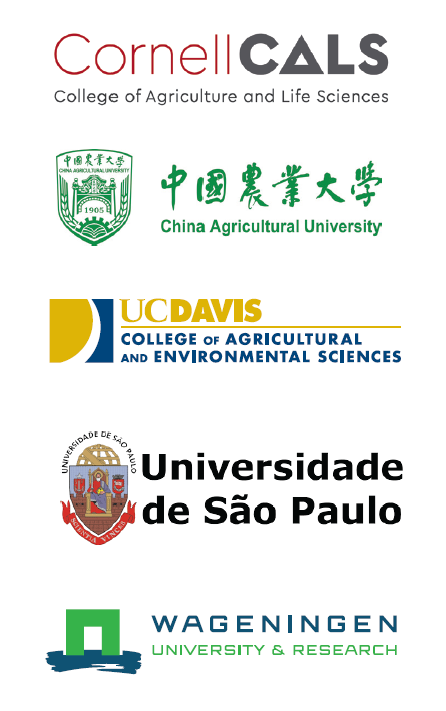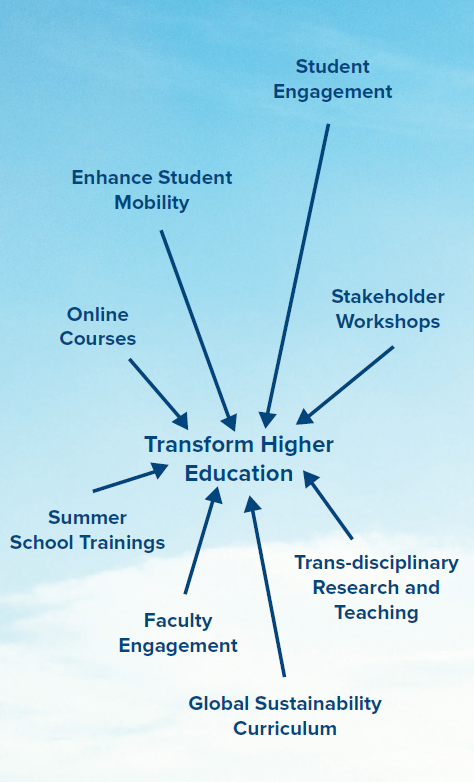A5
KNOWLEDGE, TRAINING, AND EDUCATION FOR SUSTAINABLE AGRICULTURAL AND FOOD SYSTEMS
Ambitions regarding the transformation of higher education

VISION:
To sustainably feed the world’s expanding population is widely recognized as among the greatest challenges of our society.
In today’s interconnected world, this challenge is inherently of global scope. It also requires transformations of the world’s agricultural and food systems based on ideas and innovations that cut across geographical, cultural and disciplinary borders. The need for transformational changes motivated five top-ranked academic institutions in the domain of agricultural, food system and environmental sciences to join forces and form the Agrifood 5 (A5) Alliance.
The A5 founding members—China Agricultural University, Cornell University, University of California, Davis, University of Sao Paulo, and Wageningen University & Research—are recognized globally for their scientific knowledge, research expertise, teaching and training in sustainable agriculture and food systems.
Specific curriculum activities may include:
E-learning
Bring E-learning to the forefront. Most of our A5 members are developing MOOC’s or other distance-learning courses, but have done so independently using different existing platforms. The main objective would be to create a central archive of existing and joint E-learning courses. Moreover, joint E-learning coursework will be developed specifically for universities in the developing world, so students globally can take advantage of the course content.
Summer School
Develop A5 summer school courses available to students from throughout the world. Courses offered through A5 will be selected based on student interest and the level of global engagement sought.
Workshops
Convene workshops that discuss and highlight transformations for agri-food, with topical areas of wide interest by all stakeholders such as academia, policy-makers, industry, and consumers. Topics will focus on raising awareness, public engagement and knowledge sharing, and improving the dialogue between agriculture and society.
Leadership
Engage with university leadership worldwide to promote transdisciplinary teaching and research and increase their engagement with communities off-campus to build public support, awareness and trust. For example, UC Davis is committed to a ‘Global Education for All’ initiative, ensuring that every student graduates with the knowledge, skills and experiences that will prepare them to thrive in today’s global, interconnected world where they must communicate and collaborate with people across diverse backgrounds and perspectives.
Integrate
Integrate issues of global sustainability into the undergraduate and graduate curricula. A5 addresses global sustainability challenges across disciplines and geographies. For example, meeting the challenge of global food security involves not only improved agricultural yields but also better crop nutrition, clean and disease free water and soil, market access and growth of value chains, reduced gender biases and general social, political, geographical and institutional considerations.

The scientific expertise of the A5 is tremendous—with more than 10,000 scientists—and complementary, with a collective knowledge base that is unprecedented across the science and engineering fields of the agricultural domain, including social dimensions.
A5 will prioritize initiatives that are value- added for its stakeholders (global forums, international research organizations and donors, global industries), raise awareness of the central importance of agriculture in addressing global challenges of poverty reduction and food security, as well as activities that make agriculture and science a trusted resource for the general public.
Recent Activities
March Meeting in Wageningen 2024
A5 has the objective to tap synergies of the top agricultural universities in the world. In 2024, the group met in Wageningen, which also coincided with the University and Research Celebration of the 106th Anniversary (Dies Natalis) of WU and the transfer of rectorship to Prof. Kroez. We reviewed current plans and reaffirmed that priorities are highlighting the role of A5 to promote how universities, through research and advocacy, can play a key role in addressing current and emerging global challenges. The WUR seminar highlighted a range of their impactful work and allowed members to engage with the lead researchers. The A5 members participated with the trial ITEMS course, being developed by WUR.

